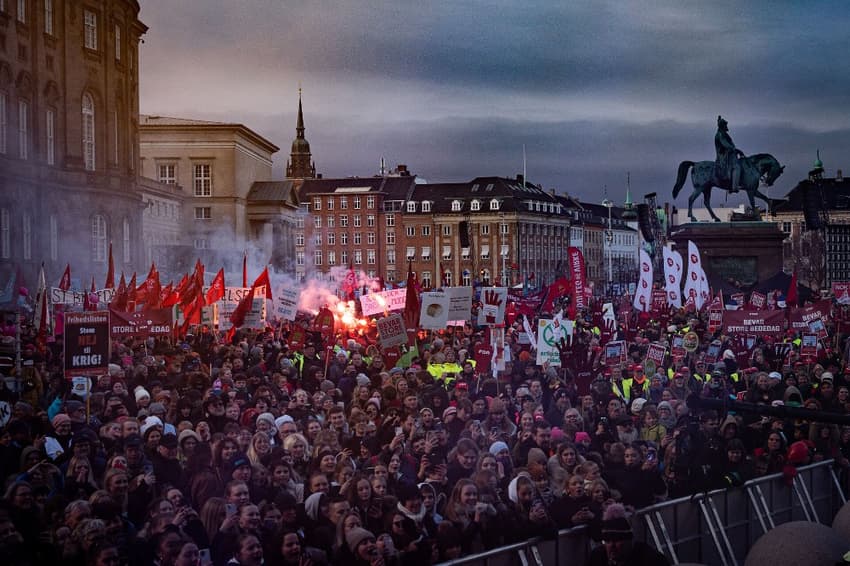Danes protest against plan to abolish public holiday

Tens of thousands of Danes protested on
Sunday against the government's plan to abolish a public holiday to help fund
the defence budget.
"It's a totally unfair proposal", said Lizette Risgaard, the head of the FH union which organised the demonstration and which has 1.3 million members in the country of 5.9 million inhabitants.
Protesters, estimated at between 40,000 and 50,000 by police and organisers, gathered outside parliament in Copenhagen and carried signs reading "Hands Off Our Holiday" and "Say No to War".
Around 70 buses ferried in demonstrators from across Denmark.
Denmark's left-right government coalition, in power since December and led by Social Democratic Prime Minister Mette Frederiksen, plans to scrap the religious holiday known as Great Prayer Day, observed since the 17th century.
The government wants to use the money generated to raise the defence budget to NATO's target of 2 percent of GDP by 2030, instead of 2033 as previously planned.
It insists the accelerated calendar is necessary due to Russia's invasion of Ukraine.
But Danish unions argue the decision to make Danes work an extra day violates the country's sacrosanct collective wage agreements, negotiated by the unions and the government.
The government decision is "breaking into our Danish model", Risgaard told AFP.
"The next time we in our parliament think that we need some more money, will they take another holiday or a Sunday and say, 'oh you'll have work there'," she said.
READ ALSO:
- Danish economists say abolition of Great Prayer Day is ‘not necessary’
- Angry trade unions say government is ‘attacking Danish model’ over plans to scrap holiday
- Denmark formalises plan to abolish public holiday
Mads Overgaard, an 18-year-old student, said he came out to support the Danish model.
"It's very important that it doesn't change, because it's one thing to change this case, but what will they do next time?", he told AFP.
Kurt Frederiksen, the 56-year-old head of the hotel and restaurant branch of the 3F union, said he also disagreed with the government using the money to boost defence.
"We don't think that money for war will ever make peace", he said.
Meanwhile, Johannes Gregers Jensen, the Dean of Copenhagen in Denmark's Evangelical-Lutheran Church, of which around 73 percent of Danes are members, said the main problem was the "principle that is broken here".
Denmark has a long tradition whereby Church matters "are decided by the people in the Church and the government shouldn't put their finger into that", he said.
"They are doing that... and that's a huge problem."
Comments
See Also
"It's a totally unfair proposal", said Lizette Risgaard, the head of the FH union which organised the demonstration and which has 1.3 million members in the country of 5.9 million inhabitants.
Protesters, estimated at between 40,000 and 50,000 by police and organisers, gathered outside parliament in Copenhagen and carried signs reading "Hands Off Our Holiday" and "Say No to War".
Around 70 buses ferried in demonstrators from across Denmark.
Denmark's left-right government coalition, in power since December and led by Social Democratic Prime Minister Mette Frederiksen, plans to scrap the religious holiday known as Great Prayer Day, observed since the 17th century.
The government wants to use the money generated to raise the defence budget to NATO's target of 2 percent of GDP by 2030, instead of 2033 as previously planned.
It insists the accelerated calendar is necessary due to Russia's invasion of Ukraine.
But Danish unions argue the decision to make Danes work an extra day violates the country's sacrosanct collective wage agreements, negotiated by the unions and the government.
The government decision is "breaking into our Danish model", Risgaard told AFP.
"The next time we in our parliament think that we need some more money, will they take another holiday or a Sunday and say, 'oh you'll have work there'," she said.
READ ALSO:
- Danish economists say abolition of Great Prayer Day is ‘not necessary’
- Angry trade unions say government is ‘attacking Danish model’ over plans to scrap holiday
- Denmark formalises plan to abolish public holiday
Mads Overgaard, an 18-year-old student, said he came out to support the Danish model.
"It's very important that it doesn't change, because it's one thing to change this case, but what will they do next time?", he told AFP.
Kurt Frederiksen, the 56-year-old head of the hotel and restaurant branch of the 3F union, said he also disagreed with the government using the money to boost defence.
"We don't think that money for war will ever make peace", he said.
Meanwhile, Johannes Gregers Jensen, the Dean of Copenhagen in Denmark's Evangelical-Lutheran Church, of which around 73 percent of Danes are members, said the main problem was the "principle that is broken here".
Denmark has a long tradition whereby Church matters "are decided by the people in the Church and the government shouldn't put their finger into that", he said.
"They are doing that... and that's a huge problem."
Join the conversation in our comments section below. Share your own views and experience and if you have a question or suggestion for our journalists then email us at [email protected].
Please keep comments civil, constructive and on topic – and make sure to read our terms of use before getting involved.
Please log in here to leave a comment.